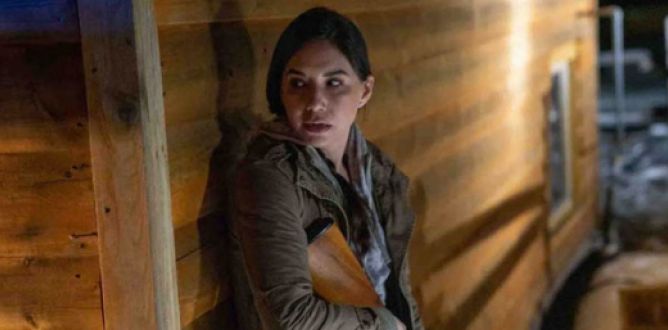Don’t Say Its Name Parent Guide
It's a little hit and miss, but this movie provides entertainment and a look at complex issues for older genre fans.
Parent Movie Review
Mining giant WEC is aggressively acquiring land for exploitation, including a large part of some local tribal land. When indigenous activist Kharis Redwater (Sheena Kaine) speaks out against the corporation, she’s found dead by the side of the road. Tribal police officer Betty (Madison Walsh) is suspicious, but the death appears to be a hit and run, and it’s going to take time to find suspects. The plot deepens when a surveyor for the mining company is horrifically mutilated in the woods, followed by a poacher. Witnesses to the murders say they didn’t see anything, just black birds circling in the air and a bad smell before the victim was slashed by an invisible assailant. Betty realizes she needs help, so she deputizes Park ranger and army veteran Stacey (Sera-Lys McArthur) – but if they want to get to the bottom of this, they’re going to have to start looking in more traditional spaces…
I enjoyed this film, but I’ll admit, it’s a little hit and miss. Madison Walsh and Sera-Lys McArthur are the highlights of the film, and they really make their characters pop in the frozen woods of Bragg Creek, Alberta where they shot the movie. This may be the only film I’ve ever seen with indigenous women in both lead roles, and they both do a fantastic job. The writing usually helps them stand out, but some of the dialogue can be a little over-expository. The other problem is, unfortunately, the antagonist. As long as the antagonist remains invisible, it’s plenty scary, but once you get a glimpse, it becomes more comedic than horrific. I’ve observed this in plenty of other movies, but it is particularly noticeable in this film – unless you’re scared of watching someone wander down a hallway, the last fifteen minutes are probably going to be a bit of a letdown for you.
I’ll admit, I was a little concerned about how much negative content this movie was going to have. The last indigenous supernatural thriller I saw at this film festival involved a zombie biting someone’s genitals off, and that’s not an easy thing to forget. However, Don’t Say Its Name is considerably less appetite-suppressing. There is still some bloody violence, which includes someone getting their throat torn out and a man being disemboweled, but there’s also far less profanity, no nudity or overt sexual content, and a minimum of social drinking and brief smoking.
Don’t Say Its Name isn’t a great movie to watch over dinner, but it might be watchable for older teens and adults – provided they’re not particularly queasy. More to the point, the film raises important questions about land use, indigenous rights, and colonization. Despite its clunkier elements, this is a fun movie with likeable, well-acted characters and I’m glad I watched it. Given some of the movies I’ve seen this month, I can’t tell you what a relief that is.
Directed by Rueben Martell. Starring Madison Walsh, Sera-Lys McArthur, and Julian Black Antelope. Running time: 84 minutes. Theatrical release September 30, 2021. Updated February 24, 2022
Don’t Say Its Name
Rating & Content Info
Why is Don’t Say Its Name rated Not Rated? Don’t Say Its Name is rated Not Rated by the MPAA
Violence: People are mangled, disemboweled, lacerated, and generally messily murdered. An individual is caught in a bear trap and shot repeatedly before being killed with a hatchet. An unpleasant person is pistol-whipped in the face. An individual is struck and killed with a truck offscreen. A person’s heart is removed and thrown in a fire.
Sexual Content: There are a few brief sexual references and a reference to rape.
Profanity: There are eight sexual expletives, four scatological terms, and occasional uses of mild profanity and terms of deity.
Alcohol / Drug Use: Adult characters are seen smoking and drinking. There are references to an individual having THC in their system, although the film is set in Canada where marijuana products are legal.
Page last updated February 24, 2022
Don’t Say Its Name Parents' Guide
How have corporations abused the trust of indigenous communities in Canada? What are some projects that have attracted controversy for failing to recognize the wishes of the indigenous population regarding their land? How have corporations and the Canadian government responded? Which other countries have these issues? How have they responded to them?
Brookings: Uncommon ground: The impact of natural resource corruption on indigenous peoples
The Canadian Encyclopedia: Rights of Indigenous Peoples in Canada
Politics.ca: Most Indigenous people support resource development: poll
Indigenous Foundations: Aboriginal Rights
Native American Rights Fund: Protect Tribal Natural Resources
NPR: 2 Years After Standing Rock Protests, Tensions Remain But Oil Business Booms
Brookings: On Indigenous Peoples Day, new ideas for American Indian land rights
Creative Spirits: Aboriginal land rights
Home Video
Related home video titles:
Other movies about Canada’s indigenous communities include Blood Quantum, Red Snow, Beans, and The Grizzlies. South of the border, films like Wind River, Indian Horse, Hostiles, and Dances with Wolves tell a variety of stories about Native American groups. Supernatural thrills in remote towns can be found in films like Werewolves Within, Willy’s Wonderland, Things Heard and Seen, The Woman in Black, and The Others.

